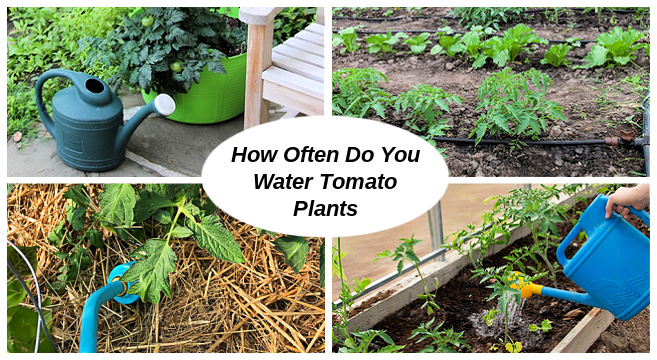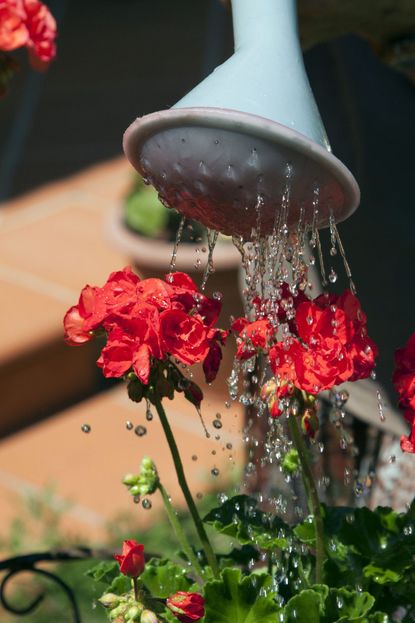For most container gardens, water every 1-2 days depending on plant needs and weather conditions. Proper watering is essential for healthy plants and optimal growth in your container garden.
It is important to understand the specific water requirements of your plants to avoid over or under watering. Factors such as plant type, container size, and environmental conditions will influence how frequently you should water. By monitoring soil moisture levels and observing your plants regularly, you can adjust your watering schedule accordingly.
Consistent and adequate watering will help your container garden thrive and produce beautiful, healthy plants. Remember, moderation is key when it comes to watering your container garden.

Credit: savvygardening.com
The Importance Of Proper Watering
The frequency of watering your container garden is crucial for plant health. Proper watering involves balancing moisture to prevent over and underwatering. Overwatering can lead to root rot and fungal diseases, while underwatering can cause wilting and stunted growth. It is important to check the moisture level of the soil regularly and adjust the watering schedule based on the specific needs of your plants. Factors such as temperature and humidity also affect the watering frequency. By maintaining the right moisture balance, you can ensure the optimal growth and health of your container garden.
Understanding Container Gardens
Container gardens are a great option for those who have limited space or want to add some greenery to their balconies or patios. However, container planting comes with its own unique challenges. Understanding these challenges is crucial to ensure that your plants thrive. One of the most important factors that influence the health of your container garden is watering. The frequency of watering depends on various factors such as the type of plants, the size of the container, the weather conditions, and the soil type. It’s essential to monitor the moisture level of your soil regularly and water your plants when the top inch of soil feels dry. Overwatering can be as harmful as underwatering, so ensure that you don’t water your plants too frequently.
| Factors Influencing Water Needs |
|---|
| Type of plant |
| Size of container |
| Weather conditions |
| Soil type |
Signs Your Plants Need Water
Visual cues from your plants include wilting leaves and drooping stems. Soil dryness tests can be performed by sticking your finger into the soil or using a moisture meter. If the soil feels dry to the touch or the meter indicates low moisture levels, it’s time to water. Overwatering can be just as damaging as underwatering, so it’s important to strike a balance. Keep an eye out for these signs to ensure your container garden receives the right amount of water.
How Often To Water
Watering your container garden is essential for the health and growth of your plants. The frequency of watering depends on various factors, including the type of plants, the size of containers, and the weather conditions.
General guidelines suggest that you should water your container garden when the top inch of soil feels dry to the touch. This can range from once a day to once a week, depending on the specific needs of your plants.
Adjusting your watering schedule to the seasons and weather is crucial. During hot summer months, plants may require more frequent watering, while in cooler seasons, they may need less. Additionally, consider the type of soil you are using and the drainage capabilities of your containers. Sandy soil tends to dry out faster, requiring more frequent watering, while clay soil retains moisture for longer periods.
Observing your plants closely and monitoring the moisture levels in the soil will help you determine the optimal frequency for watering your container garden. Remember to water thoroughly, ensuring that the water reaches the roots, and avoid overwatering, which can lead to root rot and other issues.
Best Time Of Day For Watering
When it comes to watering your container garden, it’s essential to do so at the right time of day. Morning watering has several advantages, including allowing the plants to absorb the moisture before the heat of the day. This can help prevent evaporation and ensure the plants have sufficient water throughout the day. However, there are also considerations for evening watering. While it can be a convenient time, the moisture left on the leaves overnight can lead to fungal diseases. It’s important to find the balance and adjust based on your specific garden’s needs.

Credit: www.gardeningknowhow.com
Watering Techniques For Success
For successful container gardening, deep watering is essential. This technique involves saturating the soil thoroughly to encourage root growth. Self-watering containers can be a convenient option as they provide a reservoir for consistent moisture supply.
Tools To Help With Watering
When maintaining your container garden, moisture meters are helpful tools to ensure proper watering. These gadgets provide accurate readings to prevent overwatering or underwatering your plants. Additionally, DIY solutions such as self-watering systems or irrigation spikes can help maintain consistent moisture levels in your containers. Implementing these tools and gadgets will assist in promoting healthy growth and thriving plants in your garden.
Maintaining Your Container Garden
| Maintaining Your Container Garden |
|
Check soil moisture regularly by inserting a finger into the soil. Adjust watering frequency based on weather conditions and plant needs. Keep an eye on signs of overwatering or underwatering like wilting or yellow leaves. |

Credit: savvygardening.com
Frequently Asked Questions
How Often Should I Water My Container Garden?
The frequency of watering your container garden depends on various factors such as the type of plants, soil moisture, weather conditions, and container size. Generally, it is recommended to water your container garden when the top inch of soil feels dry.
Avoid overwatering as it can lead to root rot and other plant diseases.
What Are The Signs That My Container Garden Needs Watering?
Some signs that your container garden needs watering include wilted leaves, dry soil, and the container feeling lighter when lifted. You can also check the moisture level by sticking your finger into the soil. If it feels dry, it’s time to water your plants.
How Can I Prevent Overwatering My Container Garden?
To prevent overwatering your container garden, ensure that your containers have proper drainage holes to allow excess water to escape. Use well-draining soil and water your plants only when the top inch of soil feels dry. Additionally, avoid leaving standing water in saucers or trays as it can lead to root rot.
Conclusion
So, how often should you water your container garden? Well, it ultimately depends on various factors such as the type of plant, the size of the container, the temperature, and humidity. However, a general rule of thumb is to check the soil moisture level regularly and water when the top inch of soil feels dry.
Overwatering or underwatering can harm your plants, so it’s crucial to find the perfect balance. By following these tips and considering your specific plant’s needs, you can keep your container garden thriving all season long.
